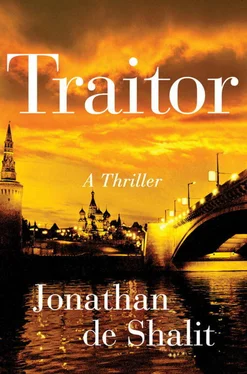“We get quite a few who approach us with the same kind of offer, even if they aren’t able to express themselves as clearly and deliberately,” Duke added contemplatively, “but this guy gave me the impression that if we manage things properly, we’ll be able to recoup our investment. Look, if it’s of no interest to you, I’ll pass on his details to headquarters in Langley. I’ll have to file some kind of a report anyway. But if you want to develop this asset, I can kill the Langley angle.”
Gunther signaled to the waiter, who was standing at the back of the bar, his purple uniform blending in with the velvety wall, and ordered another glass of whisky. He appreciated Duke’s gut feelings, but wanted a better understanding of where his faith in the walk-in was coming from. His organization would take on the operation only if its potential value was assessed to be particularly high. Not every Israeli who was willing to work with the Americans would be willing to work with the East German intelligence service, too. In fact, the chances were very low. Establishing a relationship with such a walk-in and developing him into a real agent would require costly and complex handling under a foreign identity, an American identity, and making such an investment would be worthwhile only if the future promised a real return. He asked Duke to elaborate on his encounter with the young man, not to spare any details, and in particular, he stressed, he wanted to hear his insights and impressions with regards to the man’s character, with respect to his motives—and also Duke’s view of the future, of how he saw the operation in five years’ time, in ten years.
Gunther was adept at doing what Duke’s CIA superiors had long forgotten. Unlike them, he didn’t see Duke as an old, worn-out dog that couldn’t learn new tricks, but knew instead to seek his advice, appreciate his opinions, and listen to him. He sincerely valued his judgment. And under such conditions, in this type of atmosphere, Duke flourished. He presented his case in a detailed and well-organized manner, distinguishing between facts and assessments and allowing his imagination to run free. He drew on his experience to paint the bigger picture with broad and bold brushstrokes, yet took care at the same time not to omit the finer details, the subtle areas of light and shadow, the translucent dabs of color. He was an intelligence officer, and in the presence of Gunther, and together with Gunther, in fact, he was also an artist of sorts, perhaps even a bit of a poet, one who could cast an eye into the future.
Gunther waited for several minutes after Duke had completed his report before speaking again. “I’m going to advise taking it on,” he said. “Headquarters in Berlin will have to make the decision, of course, but I’ll strongly recommend it. It may take time,” he warned, “and you’ll have to handle things delicately from your end. File a brief and banal report to Langley. Tell them you got the impression that he’s nothing more than a money-hungry fraud, with symptoms of a slight intelligence addiction. But note explicitly that the final decision is theirs to make. And one more thing,” Gunther added after a moment’s thought, “send them an incorrect phone number in the report. Jumble two digits in his phone number. You can always blame the typist in the cypher office…. With a bit of effort, they can always locate him if they want to, via the parliament’s telephone exchange or simply by knocking on his door at home,” he said with half a smile, “but if they have no particular reason to be eager to get their hands on him, their idleness and workload will win the day. You know, of course, that I won’t be able to inform you if we’ve decided to pursue the matter with him. When it comes to operations that could turn into something special, the need to maintain a high level of confidentiality from the outset is particularly important. But we’re going to need real-time updates from you—if your guys decide to do something with him after all. It’s best for the mistakes to be made elsewhere, and not by us, my friend,” Gunther said in a cheerful tone, his eyes suddenly moist. “You really are something special. It’s a shame that too many of our officers can’t match you for intelligence, experience, and the ability to understand the human psyche. It’s good to have you on our side.”
Gunther stood up, approached Duke, and embraced him warmly. “It was good to see you; we don’t do it often enough,” he said as he stepped back a few paces, moving away from Duke and toward the exit, waving absentmindedly to say good-bye, good-bye and see you around.
STASI HEADQUARTERS, EAST BERLIN, 1983
Gunther—christened with the name Werner, but referred to by his ops name by almost everyone in the Stasi who knew him—burst into the bureau of the director of the Stasi’s foreign espionage division, the Main Directorate for Reconnaissance. He hung up his wet jacket in the entrance hall, warmed his hands with undeniable glee over the noisy radiator, winked at Hannelore, the young office clerk who was sitting behind her desk in the corner like a frightened rabbit, and planted a loud kiss on the cheek of Marlene, the head secretary, mumbling softly as he did so, “You smell so good, Marlene. Lucky I don’t work at headquarters; you’d drive me crazy and I’d have to set aside all matters of state just to be by your side all the time.” Marlene blushed and lightly slapped his hand. “You’re all mouth and no trousers, Werner,” she said. “You’re a big-time talker and a small-time playboy. Fortunately for you, you’re good at what you do. Otherwise your big mouth and the Western mannerisms you’ve adopted would land you a job in the filing department at best, if not a posting to northern Siberia. And there, as you well know, the winters are very long,” she added for emphasis, a stern look on her face. “Enough, enough with the tough attitude,” Gunther said with a smile, glancing out of the corner of his eye at Hannelore, who had shrunk back in her chair but whose big eyes remained fixed on him with obvious wonderment. “If only I had a chance with you, I’d do anything…” he said, allowing his words to fade out, like someone who knows there’s no point—because Marlene had never married and, since the age of twenty, had dedicated her life to serving the state and the party. For almost thirty-eight years already, the organization, as immense and intimidating as it was, had been the recipient of her real admiration and loyalty, and her love, if anything close to love actually remained in her dry and withered soul at all, was undoubtedly reserved for Markus, the legendary head of the foreign espionage division. And Markus, who just then stepped out of his office, his face aglow, wrapped Gunther in a tight embrace. “Sir!” Gunther said; and Markus kissed him on both cheeks, announcing to the room, with Hannelore drinking everything in through her gray eyes and Marlene busying herself again with the pile of cardboard folders on her desk, “I love this man like a brother!”
Markus and Gunther sat down on two time-worn and faded armchairs in the corner of Markus’s office, a constant source of surprise in terms of its modest dimensions and rudimentary office furniture. Steaming cups of tea stood on the low table alongside them, and each man held a small glass of clear and viscous schnapps in his hand. It was a meeting of two masters. When it came to understanding the human psyche, man’s weaknesses and desires, they were artists second to none. Gunther, the long-serving field operative, was blessed with a natural talent he had nurtured and polished through the years on end he had spent identifying, recruiting, and handling agents. Markus, who had started out in fact as a political theorist and was fast-tracked into the high-ranking position he currently occupied at the absurd age of just twenty-four, was blessed with a gift from God. He embodied a rare mixture of sensitivity and cruelty, of compassion hardened by icy determination. As profound as it was intuitive, his understanding of the shadowy world of the agents—spies who betray their countries and peoples—was based less on personal experience and more on a unique ability to get a clear reading of the agents’ psyches from the gut feelings and reports of his people. He could always pinpoint the drive behind a particular individual’s willingness to sell his soul and loyalty—money, love, or recognition, and sometimes also a desire for vengeance or simply the thrill of adventure. Both Markus and Gunther were senior officers in the secret service of East Germany, which was and still remained not only an ally but also a faithful servant of the Soviet Union. Both bore military ranks, with Markus a general and Gunther a colonel. But they donned their festive dress uniforms, adorned with gold aiguillettes and military decorations, only on a handful of occasions during the year, mostly to party events they were required to attend. Despite their shared hatred of formalities and superfluous pomp and circumstance, they identified fiercely with their country. They both knew that the mighty and historic triumph over fascism could only have been achieved thanks to the endless sacrifice, bravery, and daring of the communist faithful. Despite their gripes from time to time about the party’s bureaucracy, about its conservative approach and random brutality, they hadn’t forgotten the tremendous accomplishments, the huge progress that had been made, and primarily the immense strength of spirit that had instilled the socialist ideology in the masses, in the common people, who were the very salt of the earth. Above all, however, they loved their profession, which they viewed both as a calling and as a form of complex artistry. They loved the never-ending war of minds with their enemies in the West, dealing constantly with the army of agents they had amassed at their side and with the objects in their secret crosshairs. And thus, at ease and with a sense of camaraderie based on long years of work and true friendship, the two discussed the Israeli walk-in who had knocked on the Americans’ door and could be ripe for the picking—if they so desired.
Читать дальше












